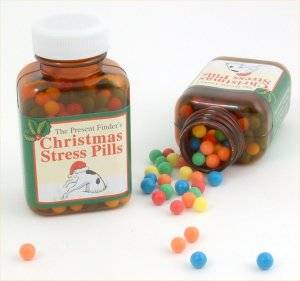The holidays are a time for fun, food, family, gifts — and stress, with more women tending to suffer than men and turning to food, booze and the couch to get over the holidays.
Nearly half of all U.S. women experience greater stress during the holidays, according to a survey by the American Psychological Association.
"Women report a bigger increase in stress of the holidays and seem more vulnerable to the effects of stress of the holidays," Russ Newman, a psychologist who is the association’s executive director for professional practice, told Reuters.
The survey found that 44 percent of the 417 woman contacted in an October telephone survey were more likely to report an increase in stress during the holiday season compared with 31 percent of 369 men.
Many respond to stress by eating more, drinking more alcohol or "being a couch potato," Newman said.
"All three together are very unhealthy ways to manage the increased stress of the holidays," the psychologist said.
While they may seem to help in the short run, they can have health and psychological effects, such as obesity, cardiovascular disease, diabetes and high blood pressure.
"In the long run, it winds up increasing stress," said Newman.
The "couch potato" approach was far and away the most popular way for women to de-stress, according to a survey by Hallmark Magazine. Of 277 women who replied to the survey, 37 percent said their favorite strategy was to "Hide out: stay home and lie around — watching TV, reading, etc."
Other sources of stress? Family gatherings and trying to stay on a diet.
Why does stress hit more women than men?
"Women take more responsibility for gift buying, festivities, gatherings, meals and all of the things that increase the stress of lack of time," Newman said.
So how should women — and men — deal with stress?
Newman urges taking time out for yourself and finding healthy ways to manage stress, such as exercise, relaxing activities with friends and family, or meditation. He also recommends setting realistic expectations for time and money.
Noelle Nelson, author of the "Power of Appreciation" series of books, recommends cutting up charge cards and only buying presents with cash, pushing as many plans as possible to after the New Year, and looking for the positive in even the most unsettling of relatives.
"It may be the person’s clothes, a ring, their eyes — it doesn’t matter. By focusing on what you like, you can better disregard the stuff that makes you crazy," said Nelson.
Twenty-two percent said they called a friend, while 8 percent "pig out." The other strategies: going to a day spa (6 percent), making out (5 percent) and working out (3 percent).
What are the biggest sources of stress? According to Newman, lack of time, lack of money and pressure to give gifts or, as he put it, "the commercialism and hype" of holidays.


 Women and holiday stress
Women and holiday stress